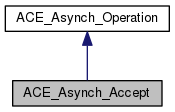This class is a factory for starting off asynchronous accepts on a listen handle. This class forwards all methods to its implementation class.
More...
#include <Asynch_IO.h>
|
| class | Result |
| | This is that class which will be passed back to the {handler} when the asynchronous accept completes. More...
|
| |
|
| | ACE_Asynch_Accept (void) |
| | A do nothing constructor. More...
|
| |
| virtual | ~ACE_Asynch_Accept (void) |
| | Destructor. More...
|
| |
| int | open (ACE_Handler &handler, ACE_HANDLE handle=ACE_INVALID_HANDLE, const void *completion_key=0, ACE_Proactor *proactor=0) |
| |
| int | accept (ACE_Message_Block &message_block, size_t bytes_to_read, ACE_HANDLE accept_handle=ACE_INVALID_HANDLE, const void *act=0, int priority=0, int signal_number=ACE_SIGRTMIN, int addr_family=AF_INET) |
| |
| virtual ACE_Asynch_Operation_Impl * | implementation (void) const |
| | Return the underlying implementation class. More...
|
| |
| int | open (ACE_Handler &handler, ACE_HANDLE handle, const void *completion_key, ACE_Proactor *proactor) |
| |
| int | cancel (void) |
| |
| ACE_Proactor * | proactor (void) const |
| | Return the underlying proactor. More...
|
| |
| virtual | ~ACE_Asynch_Operation (void) |
| | Destructor. More...
|
| |
This class is a factory for starting off asynchronous accepts on a listen handle. This class forwards all methods to its implementation class.
Once {open} is called, multiple asynchronous {accept}s can started using this class. A ACE_Asynch_Accept::Result will be passed back to the {handler} when the asynchronous accept completes through the {ACE_Handler::handle_accept} callback.
| ACE_Asynch_Accept::ACE_Asynch_Accept |
( |
void |
| ) |
|
A do nothing constructor.
| ACE_Asynch_Accept::~ACE_Asynch_Accept |
( |
void |
| ) |
|
|
virtual |
| int ACE_Asynch_Accept::accept |
( |
ACE_Message_Block & |
message_block, |
|
|
size_t |
bytes_to_read, |
|
|
ACE_HANDLE |
accept_handle = ACE_INVALID_HANDLE, |
|
|
const void * |
act = 0, |
|
|
int |
priority = 0, |
|
|
int |
signal_number = ACE_SIGRTMIN, |
|
|
int |
addr_family = AF_INET |
|
) |
| |
This starts off an asynchronous accept. The asynchronous accept call also allows any initial data to be returned to the handler specified to open().
- Parameters
-
| message_block | A message block to receive initial data, as well as the local and remote addresses when the connection is made. Since the block receives the addresses regardless of whether or not initial data is available or requested, the message block size must be at least bytes_to_read plus two times the size of the addresses used (IPv4 or IPv6). |
| bytes_to_read | The maximum number of bytes of initial data to read into message_block. |
| accept_handle | The handle that the new connection will be accepted on. If INVALID_HANDLE, a new handle will be created using addr_family. |
| act | Value to be passed in result when operation completes. |
| priority | Priority of the operation. On POSIX4-Unix, this is supported. Works like nice in Unix. Negative values are not allowed. 0 means priority of the operation same as the process priority. 1 means priority of the operation is one less than process. And so forth. On Win32, this argument is ignored. |
| signal_number | The POSIX4 real-time signal number to be used for the operation. Value range is from ACE_SIGRTMIN to ACE_SIGRTMAX. This argument is ignored on non-POSIX4 systems. |
| addr_family | The address family to use if accept_handle is ACE_INVALID_HANDLE and a new handle must be opened. Values are AF_INET and PF_INET6. |
| int ACE_Asynch_Accept::open |
( |
ACE_Handler & |
handler, |
|
|
ACE_HANDLE |
handle = ACE_INVALID_HANDLE, |
|
|
const void * |
completion_key = 0, |
|
|
ACE_Proactor * |
proactor = 0 |
|
) |
| |
Initializes the factory with information which will be used with each asynchronous call. If ({handle} == ACE_INVALID_HANDLE), {ACE_Handler::handle} will be called on the {handler} to get the correct handle.
Delegation/implementation class that all methods will be forwarded to.
The documentation for this class was generated from the following files:


 Public Member Functions inherited from ACE_Asynch_Operation
Public Member Functions inherited from ACE_Asynch_Operation Protected Member Functions inherited from ACE_Asynch_Operation
Protected Member Functions inherited from ACE_Asynch_Operation 1.8.11
1.8.11